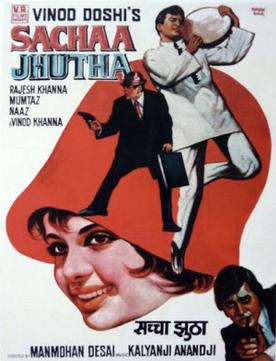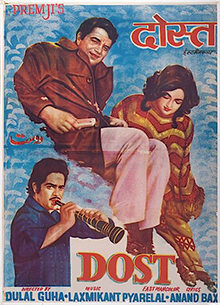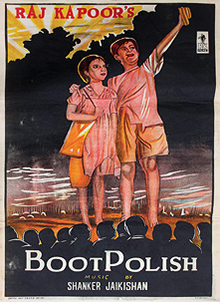
Raj Kapoor was an Indian actor, film director and producer, who worked in Hindi cinema. He is considered one of the greatest and most influential actors and filmmakers in the history of Indian cinema, and has been referred to as The Greatest Showman of Indian Cinema and as the Charlie Chaplin of Indian Cinema.

Jis Desh Mein Ganga Behti Hai is a 1960 Indian film directed by Radhu Karmakar and produced by Raj Kapoor. The film stars Padmini, Raj Kapoor and Pran in lead roles. This was the first directorial venture of Karmakar, who had previously been cinematographer for many of Kapoor's films. It was declared a "hit" at Box Office India.

Qayamat Se Qayamat Tak, also known by the initialism QSQT, is a 1988 Indian Hindi-language romantic musical film, directed by Mansoor Khan in his directorial debut, and written and produced by Nasir Hussain. The film stars Aamir Khan and Juhi Chawla in lead roles, making their acting debut. The film features music by Anand–Milind, with lyrics written by Majrooh Sultanpuri. Qayamat Se Qayamat Tak tells the story of two individuals and recounts their journey of falling in love, eloping, and the aftermath.

Henna is a 1991 Indian romance drama film, written by Khwaja Ahmad Abbas, produced and directed by Randhir Kapoor. It stars Rishi Kapoor, along with Pakistani actress Zeba Bakhtiyar in the title role and Ashwini Bhave. This film was planned and started by director Raj Kapoor, but due to his death during the filming, the remaining portions were directed by his eldest son Randhir. It is considered as the last film of Raj Kapoor. The dialogues of the film were written by the Pakistani writer Haseena Moin. The film was a critical and a commercial success and was also India's submission for the Academy Award for Best Foreign Language Film, but was not accepted as a nominee.

Kamini Kaushal is an Indian actress who worked in Hindi films and television. She is noted for her roles in films such as Neecha Nagar (1946), which won the 1946 Palme d'Or at Cannes Film Festival and Biraj Bahu (1954), which won her the Filmfare Award for Best Actress in 1956.

Sachaa Jhutha is a 1970 Indian Hindi action comedy film directed by Manmohan Desai and produced by Vinod Doshi. The film written by Desai's wife Jeevanprabha, was edited by Kamlakar Kamkhanis. The film starring Rajesh Khanna, Mumtaz, Vinod Khanna revolves around a simple villager (Bhola), who has a lookalike, a crook, who takes advantage of the former's simplicity and mirror-image. The music of the film was composed by Kalyanji-Anandji.
David Abraham Cheulkar, popularly known as David, was an Indian Hindi film actor. In a career spanning four decades, he played mostly character roles, starting with the 1941 film Naya Sansar, and went on to act in over 110 films, including memorable films such as Gol Maal (1979), Baton Baton Mein (1979) and Boot Polish (1954), for which he was awarded the 1955 Filmfare Best Supporting Actor Award.

Dost (transl. Friend) is a 1974 Hindi film. Produced by Premji, it was directed by Dulal Guha. The film stars Dharmendra, Hema Malini, Shatrughan Sinha, Asit Sen and Rehman. Amitabh Bachchan makes a guest appearance. The film's music is by Laxmikant Pyarelal.

Chori Mera Kaam is a 1975 Bollywood comedy film, produced by Chander Sadanah, directed by Brij Sadanah and written by K. A. Narayan. The film stars Ashok Kumar, Shashi Kapoor, Zeenat Aman, Pran, Deven Verma, Iftekhar and Raza Murad. The film's music is by Kalyanji-Anandji. Deven Verma won his first Filmfare Award for Best Comedian for the film.

Mujhe Jeene Do is a 1963 Indian Hindi film, directed by Moni Bhattacharjee and written by Aghajani Kashmeri. This dacoit drama stars Sunil Dutt, Waheeda Rehman, Nirupa Roy, Rajendranath and Mumtaz.

Paigham (transl. Message) is a 1959 Indian Hindi-language drama film directed by S. S. Vasan. The film stars Dilip Kumar, Vyjayanthimala in the lead roles, with Raaj Kumar, Pandari Bai, B. Saroja Devi, Motilal and Johnny Walker in other important roles. The film's music was composed by C. Ramchandra. This was the first time Dilip Kumar and Raaj Kumar appeared in a film together. They later appeared together once again over three decades later for the 1991 film Saudagar. The film was declared a blockbuster at box office.

Nalini Jaywant was an Indian actress who appeared in Hindi films in the 1940s and 1950s. Filmfare in their poll in the 1950s declared her the most beautiful woman in the movies. Actor Dilip Kumar described her "the greatest actress he ever worked with".
Samuel Martin Burke or S. M. Burke was a Pakistani civil servant, diplomat, writer and professor. He was also a member of the Indian Civil Service until 15 August 1947, when he became the only Asian to retire. After Pakistan's independence, he joined the Foreign Service of Pakistan and was appointed as a counselor at the Pakistani High Commission in London.
Ratan Kumar was the screen name of the Indian born child artist who later migrated to Pakistan. He acted in Indian and Pakistani movies. He was born as Syed Nazir Ali Rizvi. He is best known for his work in films Boot Polish (1954), Do Bigha Zamin (1953) and Jagriti (1954).

Chand is a 1959 Indian Hindi-language film starring Meena Kumari, Balraj Sahni, Pandari Bai and Manoj Kumar in lead roles. The film is directed by Lekhraj Bhakri and its music is given by Hemant Kumar.
Salma Baig popularly known as Kumari Naaz or Baby Naaz was an Indian actress in Hindi language films.
Subbiraj Kakkar popularly known as Subbiraj was an Indian character actor in Hindi-language films and television. His maternal uncle was veteran actor Prithviraj Kapoor and thus Raj Kapoor, Shammi Kapoor and Shashi Kapoor were his cousins.
Chand Burke, also known as Chand Burque, was an Indian character actress in Hindi and Punjabi language films.












